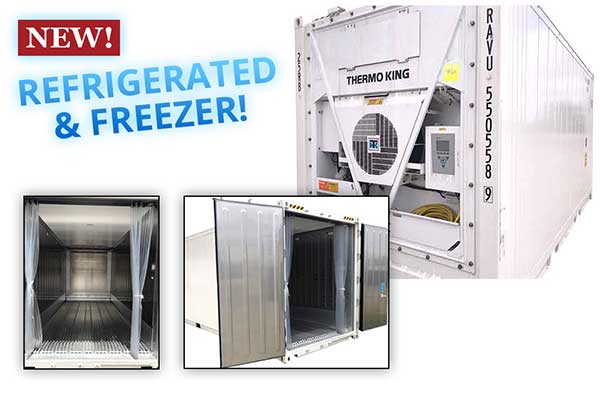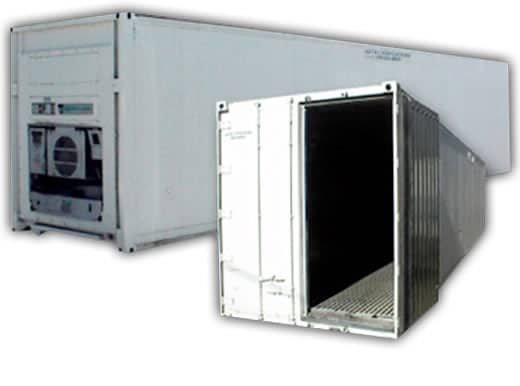Understanding Costs for Refrigerated Containers
If you’re wondering how much does a refrigerated container cost, you’ve come to the right place. Contact us for pricing to get the most up-to-date information.
Let’s understand the essentials.
Refrigerated containers, or “reefers,” are a game-changer for storing temperature-sensitive products. These containers are heavily insulated and equipped with cooling systems, allowing businesses like restaurants and farms to keep their goods fresh. They’re not just for shipping; many businesses use them for on-site storage.
Whether it’s maintaining the perfect temperature for perishable goods or providing additional storage during peak seasons, reefers offer best reliability and flexibility.
With over 50 years in the industry, we’ve seen the evolution and benefits of using refrigerated containers first-hand. If you’re interested in understanding how much does a refrigerated container cost, contact us for pricing to get the most up-to-date information.
Types of Refrigerated Containers
Refrigerated containers, also known as reefers, come in various types. Each type serves specific needs and conditions. Here’s a look at the main types of refrigerated containers:
One-Trip Containers
One-trip containers are essentially new. They have made just one trip across the ocean, so they are often marketed as “as good as new.” These units are in excellent condition, making them reliable for achieving extremely cold temperatures. They are perfect for businesses that need high-quality, dependable storage without the wear and tear of older units.
Used Containers
Used containers are more affordable options for businesses that might not have the budget for new or one-trip containers. While they have seen more usage and may show signs of wear and tear, they are still fully functional. It’s crucial to inspect these units before purchase to ensure they meet your needs, especially in terms of temperature control and door functionality.
How Much Does a Refrigerated Container Cost?
When considering the cost of refrigerated containers, several factors come into play. Whether you’re looking at new or used containers, or considering leasing options, understanding the costs can help you make an informed decision.
Cost of New Refrigerated Containers
New refrigerated containers, often referred to as “one-trip” containers, have only made one journey across the ocean. Because of their limited use, they’re almost like new and can achieve extremely cold temperatures. Contact us for pricing to get the most up-to-date information.

Cost of Used Refrigerated Containers
Used refrigerated containers are a more affordable option. Though they may show signs of wear and tear, they are still fully functional. It’s crucial to inspect these units to ensure they meet your needs. Contact us for pricing to get the most up-to-date information.

Renting Refrigerated Containers
Renting refrigerated containers is a cost-effective solution, especially for short-term needs or limited budgets. Leasing rates fluctuate based on various factors, including condition, location, market situation, and container size. Contact us for pricing to get the most up-to-date information.
Market Trends: Rental rates can vary widely depending on the current market situation. For example, during peak seasons or in high-demand locations, rates may increase.
Understanding these cost factors can help you budget appropriately and choose the right refrigerated container for your needs. Up next, we’ll explore the unique features that make refrigerated containers indispensable for transporting temperature-sensitive cargo.
Features of Refrigerated Containers
Temperature Control
Refrigerated containers, also known as reefers, are designed to maintain a specific temperature range, typically between -30°C and +30°C. This is crucial for storing perishables and frozen goods. The cooling system inside these containers often uses a vapor-compression cycle to regulate temperature. This cycle involves compressing refrigerant, which then cools the air inside the container.
Size Options
Refrigerated containers come in various sizes to suit different needs. The most common sizes are:
- 20ft Containers: These are the standard size and are widely used for smaller storage needs.
- 40ft Containers: Ideal for larger storage requirements, these containers offer more space.
- High Cube Containers: These containers are taller, providing additional vertical space, which is beneficial for storing bulky items.
Power Supply and Refrigerant
Refrigerated containers require an external power supply to keep the cooling system operational. During sea transport, they receive power from the ship.
The refrigerant components inside the cooling system play a vital role in maintaining the desired temperature. These components need to be regularly checked and maintained to ensure optimal performance.
By understanding these features, you can better appreciate the complexities involved in maintaining the right environment for temperature-sensitive cargo.
Common Problems and Maintenance Tips
Refrigerated containers are fantastic for keeping temperature-sensitive cargo safe, but they come with their own set of challenges. Here are some common problems and maintenance tips to keep your reefer running smoothly.
Leakage Issues
Leakage is a frequent problem in refrigerated containers. It usually happens because of bad seals around the openings. When seals fail, warm air can enter the container, causing the cooling system to work harder and less efficiently.
Maintenance Tip: Regularly inspect the seals around doors and other openings. Replace any damaged or worn seals immediately to prevent air leakage.
Pressure Line Damage
The pressure lines in a refrigerated container can suffer from wear and tear over time. This damage can affect the efficiency of the cooling system and lead to higher operational costs.
Maintenance Tip: Check the pressure lines during routine inspections. Look for signs of wear or damage and have them repaired by a professional technician if necessary.
Electrical Malfunctions
Electrical malfunctions are another common issue. These can be caused by various factors, including worn-out wiring, faulty components, or power surges.
Maintenance Tip: Always disconnect the power source before performing any repairs. Regularly inspect the electrical system for any signs of damage or wear. If you notice any issues, contact a professional technician for repairs.
Regular Maintenance
Regular maintenance is crucial for keeping your refrigerated container in top condition. Simple fixes can often resolve common issues like leakage, pressure line damage, and electrical malfunctions.
Maintenance Tip: Schedule routine maintenance checks with a professional technician. Regular inspections can help catch problems early and extend the lifespan of your container.
Professional Repairs
While some issues can be fixed with simple maintenance, others require professional intervention. For example, complex electrical problems or significant pressure line damage should always be handled by experts.
Maintenance Tip: Don’t hesitate to contact a professional for repairs. Regular professional maintenance can prevent minor issues from becoming major problems, saving you time and money in the long run.
By staying on top of these common problems and following these maintenance tips, you can ensure your refrigerated container operates efficiently and reliably.
Safety Precautions for Using Refrigerated Containers
Using refrigerated containers requires strict safety measures to protect both the operator and the equipment. Here are some essential precautions:
Personal Protection Equipment
Always wear personal protection equipment (PPE) such as safety gloves and glasses. This helps prevent injuries from sharp edges, electrical components, or refrigerant leaks.
Fan Safety
The fan inside the refrigerated container is powerful and can cause serious injuries. Keep hands, clothing, and tools away from the fan when it’s in motion. Always ensure the fan is turned off before performing any inspection or maintenance.
Ventilation
Work in a well-ventilated area to avoid the buildup of harmful gases. Refrigerants can be hazardous if inhaled, and proper ventilation reduces this risk.
Power Disconnection
Before making any repairs, disconnect the power source. This prevents accidental electric shocks or short circuits. Always follow the manufacturer’s guidelines for safely disconnecting and reconnecting power.
Fire Safety
In case of a fire, use a CO2 extinguisher. Do not use water-based extinguishers, as they can react with electrical components and refrigerants. Also, never bypass any electrical safety devices, as they are crucial for preventing fires and other hazards.
By following these safety precautions, you can operate your refrigerated container safely and efficiently.
Frequently Asked Questions about Refrigerated Containers
How does a refrigerated container work?
Refrigerated containers, also known as reefers, operate much like a household refrigerator but on a larger scale. They use a cooling system based on the vapor-compression cycle. This system includes a compressor, condenser, evaporator, and expansion valve.
The bottom air delivery system is critical. It allows cool air to circulate underneath the cargo, ensuring even temperature distribution throughout the container. This method helps maintain the perfect atmosphere for preserving temperature-sensitive goods.
Is a refrigerated container airtight?
While refrigerated containers can be made airtight, not all are designed this way. The main goal is to maintain a consistent temperature to preserve perishable products. Airtight options are available but are typically used for specific cargo that requires strict humidity and temperature control.
Conclusion
At Aztec Container, we understand the critical role that refrigerated containers play in maintaining the quality of perishable goods. Our commitment is to provide top-notch refrigerated containers at competitive prices, ensuring you get the best value for your investment.
Moreover, we offer customizable solutions to meet your specific needs. Whether you need a particular size, unique modifications, or specialized features, we can tailor our containers to fit your requirements perfectly.
For more information on our refrigerated containers, visit our Refrigerated Steel Containers page.
Choose Aztec Container for reliable, high-quality refrigerated containers that exceed your expectations.






